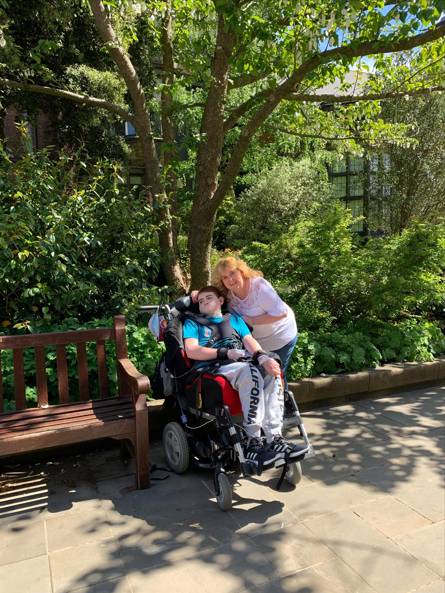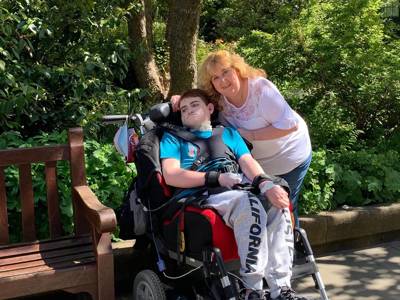Guide to disabled people’s care funding rights during hospital stays produced by Cameron Mitchell’s legal team
Lawyers who helped a severely disabled man challenge benefits cuts which threatened to leave him without adequate care during a lengthy stay in hospital have, together with Inclusion London, produced a guide to help other people know their rights when they find themselves in similar circumstances.
Posted on 04 December 2023
Cameron Mitchell, aged 22, of Carlisle, issued a legal claim in the High Court when benefits regulations resulted in his Personal Independence Payments (PIP) and his mother Nicola’s Carer’s Allowance being put on hold after he spent more than 28 days in hospital in 2021.
Cameron still needed care from his parents even though he was being treated in hospital for a lengthy period of time. The lack of funding for this threatened to leave Cameron without the care that only his parents were able to give him. His parents knew and understood his complex needs such as spotting when a seizure was imminent, to interpret his pain and communication signals and to assist with his mobility.
Eventually, thanks to representation by lawyers on the human rights team at law firm Leigh Day, Cameron’s claim was resolved and he was not left out of pocket.
Now the same legal team have produced a guide together with Inclusion London to help other disabled people be aware of their rights when they have to go into hospital or into respite care.
Cameron Mitchell with his mother, Nicola Clulow.
Its publication coincides with a report by the Health Services Safety Investigations Body (HSSIB) which says there are “persistent and widespread” risks to the safety of people with learning disabilities when they are admitted to hospital. Often this is due to lack of provision of necessary reasonable adjustments, such as support for care from carers who know and understand their complex needs.
The Leigh Day human rights legal team produced the How-to-guide after they were approached and commissioned by national charity Inclusion’s London. Inclusion London had worked closely with human rights organisation Liberty, who intervened in Cameron’s case, to argue that disabled people still have extra disability related costs while in hospital and that suspending disability benefits could breach disabled people’s human rights. Inclusion London hopes the guide will address some of the concerns raised in the HSSIB report and faced by its members when they are in hospital for extended periods.
The How-to-guide is titled Seeking funding for care required during an extended hospitalisation.
It outlines the funding support that people have a right to ask for during a hospital stay. It also explains the reasons why someone might require funding for care during a hospital stay.
It explains that, even though PIP might be put on hold while a disabled person is being cared for in hospital, if the disabled person is eligible for NHS Continuing Healthcare, and their needs are not met by the hospital, their local Integrated Care Board (ICB) has a duty to assess their needs and provide a package which meets their assessed health and social care needs. If they are not eligible for NHS Continuing Healthcare, the local authority still has a duty to ensure that any assessed needs are met. The guide includes tips on when and how to request assessments of needs.
The guide explains step by step how a disabled person can apply for support from their ICB and/or Local Authority and what to do if the request for funding is refused.
It includes a template letter to the local authority and a template letter to the ICB.
The guide was written by Leigh Day human rights solicitor Carolin Ott, who represented Cameron Mitchell when his PIP was halted and his mother’s Carer’s Allowance was also put on hold. At one point, Carolin had to urgently step in after Cameron’s Motability vehicle was about to be taken from the family.
Nicola Clulow, Cameron’s mother, said:
“When we found ourselves in a situation where we lost our benefits because of Cameron’s lengthy stay in hospital, I was completely overwhelmed. I was having to try and work out how to fund care Cameron urgently needed whilst worrying about my son who was seriously ill. The rules around what support we could ask for were very complicated and I didn’t know where to turn for help. We felt like there were so many obstacles to getting the support Cameron desperately needed. I am delighted that Leigh Day and Inclusion London have produced a guide that will hopefully make things easier for others who find themselves in this situation.”
Svetlana Kotova, Director of Campaigns and Justice at Inclusion London said:
“It costs more to live as a disabled person. We know disabled people need extra support and have extra costs when they are in hospital. Removing financial support in hospital is wrong. We know existing situation is not ideal, but we hope disabled people and their families can use this guide to get extra support they need.”
Louise Whitfield, of Liberty said:
“If you’re disabled, you should be treated with respect, and given the same human rights and fundamental freedoms as everybody else.
But by cutting off people’s Personal Independence Payments while they are in hospital, the Government is removing vital support that disabled people need to stay independent. We were very pleased to intervene in Cameron’s case, and work closely with Inclusion London on this, raising vital issues about disabled people’s right to dignity.”
Leigh Day solicitor Carolin Ott said:
“This guide has been written to help disabled people and people with particular care needs who have been admitted to hospital understand what care and support they may be able to receive in hospital. Unfortunately, Cameron is not alone in not having had his needs met in hospital and like his family, many in similar situations don’t know where to turn to ask for help or that support is even available. We hope that our work with Inclusion London provides an overview of what help may be available so that those who require additional support can get it when they need it most.”

Cameron Mitchell launches court challenge to loss of Personal Independence Benefit payments after 28 days in hospital
A severely disabled young man is applying for judicial review of a rule which halted payment of his welfare benefit after he had been in hospital for more than four weeks.



